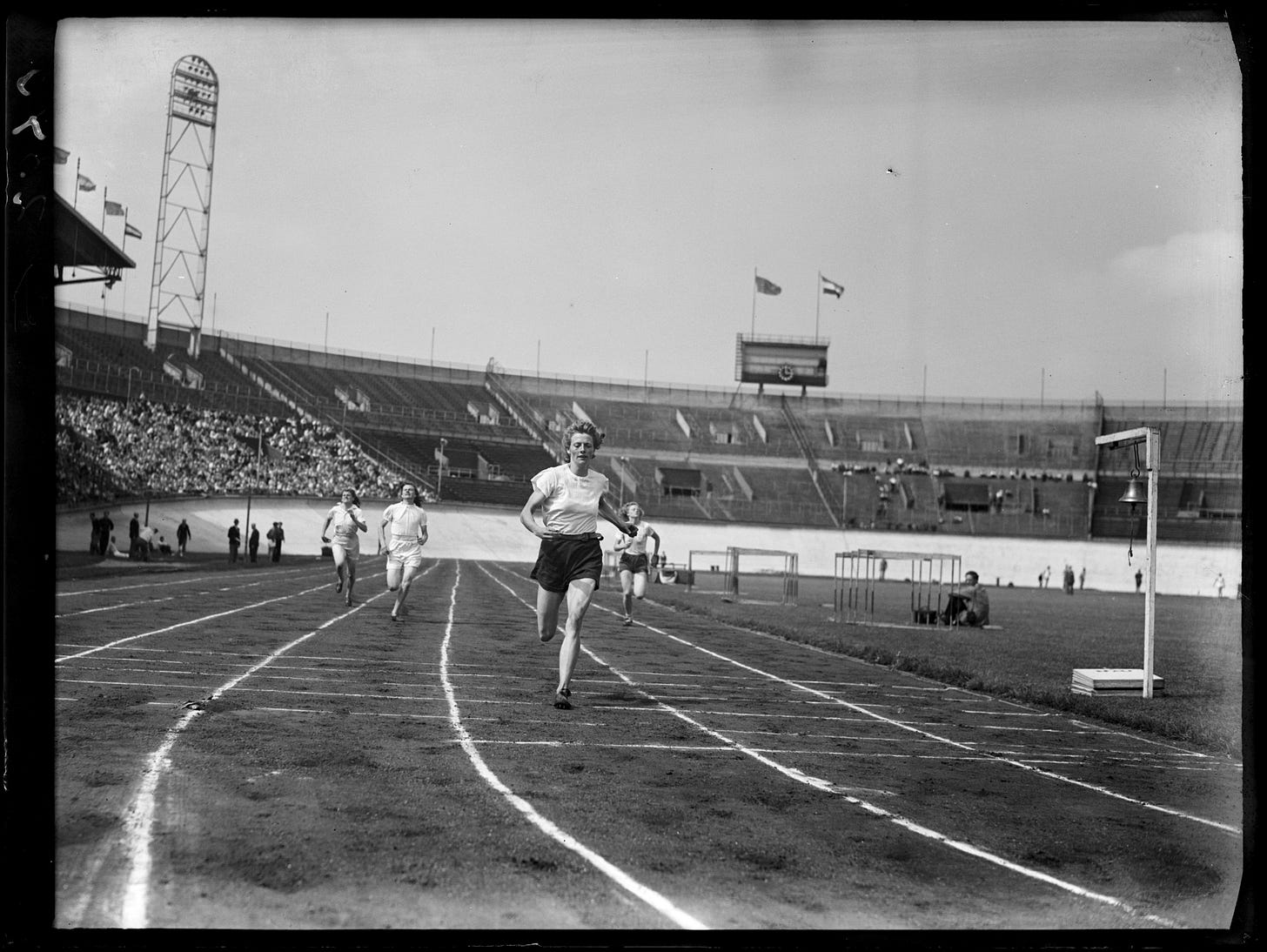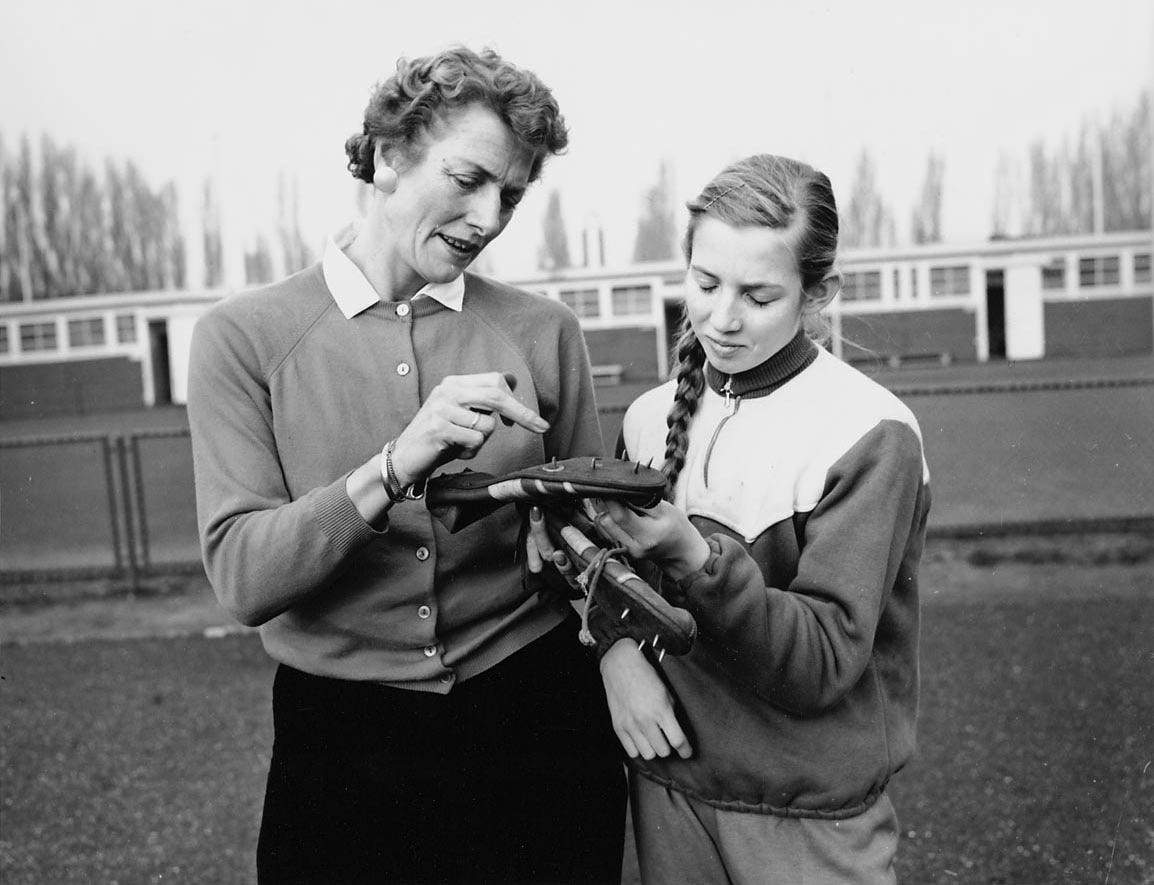Some people called Fanny Blankers-Koen the "flying housewife." The governing body of track and field simply referred to her as their greatest female athlete of the 20th century.
It was 1948. London. Barely three years since World War II's end. The bombs no longer fell, but the city was still piecing itself back together. Shattered buildings lined the streets, and austerity measures remained in place. As a result, accommodations were sparse for the Olympic athletes participating in that year's games. The men slept in the Royal Air Force barracks. Women stayed in college dorms. Athletes had to bring their own towels. City leaders decided not to build new stadiums, so the greyhound track at Empire Stadium in Wembley was converted into a cinder track to host events. And with food still rationed, some athletes later reported losing weight and falling ill. Politically, Germany and Japan weren't invited. The Soviet Union chose not to compete.
Despite all this, the games marked a momentous occasion. Twelve years had passed since the previous Olympic Games, held in Berlin in 1936. The London Games marked a celebratory and symbolic moment. Things had changed. The suffering, tragedy, and victory of the war years made these games more poignant than usual.
The Olympics are renowned for bringing together the world's greatest athletes. But in the 1948 games, one in particular stood out: Fanny.
Fanny entered the games representing Holland in track and field. She was 30 years old, stood nearly six feet tall, and, in the words of one reporter at the time, was “shy, towering, drably domesticated.” She was a mother of a 7-year-old son and a 2-year-old daughter. And three months pregnant with her third.
Many criticized her for competing. Some even wrote her letters insisting she stay home with her children. Society expected female athletes to retire after marriage or motherhood in those days. People also thought Fanny was much too old to compete.
But by then, Fanny was a seasoned competitor who knew how to handle naysayers. Her sports life began as a teenager with swimming, before she transitioned to track and field, where success came quickly. She became the Dutch national record holder in the 800-meter run at seventeen.
A year later, she competed in the 1936 Olympics, finishing sixth in the high jump and fifth in the 4x100-meter relay. She didn’t win any medals, but she felt the aura of the Games. Perhaps most memorable for her, though, was meeting Jesse Owens, the great American sprinter who won four gold medals that year. He was her hero.
Fanny entered the 1948 games as a world-record holder in the 100-yard dash, high jump, and long jump. In London, she chose to compete in the 100m, 200m, 80m hurdles, and the 4x100m relay. She won gold in all four events. She likely would have competed in more event and won even more medals, but the rules at the time limited women to just three individual track and field competitions.
When Fanny returned home, her neighbors gifted her a simple new bicycle so she could, as they put it, “go through life at a slower pace.”
Sources:
“Fanny BLANKERS-KOEN.” https://www.olympics.com/en/athletes/fanny-blankers-koen
“Fanny Blankers-Koen wins 4 golds at the 1948 Olympics.” 805Bruin,
Gambino, Megan. “Document Deep Dive: A Peek at the 1948 Games in London.” Smithsonian Magazine, https://www.smithsonianmag.com/history/document-deep-dive-a-peek-at-the-1948-games-in-london-8928109/
Internationaal Instituut voor Sociale Geschiedenis (IISG). [Fanny Blankers-Koen running in a stadium race]. Flickr, 28 Sept. 2009, https://www.flickr.com/photos/iisg/4158881322/. Accessed 2 July 2025. (no changes made)
Internationaal Instituut voor Sociale Geschiedenis (IISG). [Fanny Blankers-Koen with her daughter looking at a track shoe]. Flickr, 28 Sept. 2009, https://www.flickr.com/photos/iisg/5580664352/. Accessed 2 July 2025. (no changes made)
King, Gilbert. “How Fanny Blankers-Koen Became the ‘Flying Housewife’ of the 1948 London Games.” Smithsonian Magazine, July 31, 2012, https://www.smithsonianmag.com/history/the-flying-housewife-of-the-1948-london-games-10049278/
“London 1948: the Austerity Olympics.” Historic UK, https://www.historic-uk.com/HistoryUK/HistoryofBritain/1948-London-Olympics-Austerity-Games/
“Who was Fanny Blankers-Koen?” Newsweek, https://archive.org/details/youtube-g_4RJ5Tsupk






She is an iconic achiever. What a brave and strong,both mentally and physically, woman she was.